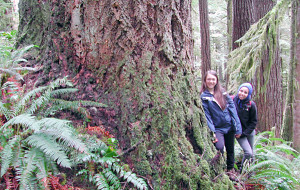December 8, 2014 — The State of Oregon has decided against privatizing the Elliott State Forest after receiving overwhelming public comment encouraging a conservation solution for the 93,000-acre state forest located northeast of Coos Bay. 1,147 out of 1,185 comments received during the public process, or 97%, encouraged the Department of State Lands and the Oregon State Land Board to protect the iconic forests for its outstanding water quality, salmon and wildlife habitat, hunting and fishing opportunities and its remarkable ability to store carbon to mitigate climate change.
FOR IMMEDIATE RELEASE
December 8, 2014
Contact:
Josh Laughlin, Cascadia Wildlands, 541-844-8182
Ed Putnam, Backcountry Hunters and Anglers, Oregon Chapter, 541-678-3548
Christy Splitt, Oregon League of Conservation Voters, 971-404-7279
Bob Sallinger, Audubon Society of Portland, 503-380-9728
Cameron La Follette, Oregon Coast Alliance, 503-391-0210
Tom Wolf, Oregon Council Trout Unlimited, 503-883-1102
State of Oregon Shelves Elliott State Forest Privatization Idea
97% of Public Comment Encourages a Conservation Solution for the Iconic Forest
The State of Oregon has decided against privatizing the Elliott State Forest after receiving overwhelming public comment encouraging a conservation solution for the 93,000-acre state forest located northeast of Coos Bay. 1,147 out of 1,185 comments received during the public process, or 97%, encouraged the Department of State Lands and the Oregon State Land Board to protect the iconic forests for its outstanding water quality, salmon and wildlife habitat, hunting and fishing opportunities and its remarkable ability to store carbon to mitigate climate change.
Instead of privatizing the forest, the Land Board, made up of Governor John Kitzhaber, Secretary Kate Brown, and Treasurer Ted Wheeler,

will continue to explore various management alternatives for the Elliott that meet public expectations as well as its Common School Fund and Endangered Species Act mandates. The State Land Board will meet Tuesday, December 9 from 9 am-12 pm at 775 Summer St. NE in Salem to further discuss future management scenarios and has extended the meeting to handle what is expected to be significant public comment.
“The state of Oregon should be given kudos for not privatizing the Elliott as elk hunters would have ultimately encountered “no trespassing” signs instead of open access into this outstanding backcountry,” said Ed Putnam with Backcountry Hunters and Anglers. “It is important that as the public process moves forward a balanced plan gets enacted that enhances the forest habitat, and keeps it in public hands.”
Earlier this year, the State Land Board voted to dispose of nearly 1,500 acres of the Elliott State Forest and quickly auctioned the acreage off to the timber industry. One timber company has already put up “no trespassing” signs and has vowed to clearcut the forest. The lands were disposed of after conservationists successfully challenged a number of illegal old-growth clearcutting projects on the forest that would have significantly impacted the marbled murrelet, an imperiled sea bird that nests in coastal old-growth forests.
“The table is set to find a lasting solution for the Elliott State Forests that protects its outstanding water quality, salmon and wildlife habitat and recreation opportunities,” said Josh Laughlin, Campaign Director with Eugene-based Cascadia Wildlands. “We will continue to work diligently with stakeholders until a plan is in place that safeguards this outstanding rainforest while at the same time meets its Common School Fund obligation.”
The Elliott State Forest provides critical habitat for a host of fish and wildlife species teetering on the brink of extinction, including Oregon Coast coho salmon. Recent data provided by state biologists demonstrate that streams originating on the Elliott State Forest play a significant role in coho salmon recovery on the Oregon Coast.
“The cool, clear streams that course through the Elliott provide essential habitat for coho salmon productivity and must be protected to ensure this iconic fish’s recovery,” said Tom Wolf, Executive Director of the Oregon Council of Trout Unlimited. “A new plan for the Elliott rainforest must entail adequate steam side buffers to protect this outstanding clean water value.”
In addition to the public comments submitted into the record, the State Land Board in October held a “listening session” in Coos Bay to hear from community members about the Elliott State Forest. More than 3:1 spoke in favor of a conservation solution for the forest.
“Oregonians should not have to choose between protecting salmon, clean water, and old-growth on the one hand, and logging to fund education on the other,” said Rhett Lawrence, Conservation Director with the Oregon Chapter of the Sierra Club. “Continuing to tie education funding to timber receipts is a failed policy of the past and we need new solutions.”
90% of the Elliott State Forest is Common School Fund land, which has a duty to generate revenue to the $1.2 billion fund. Those encouraging the decoupling of old-growth clearcutting from school funding include hunters, anglers, scientists, teachers, recreation enthusiasts and others who have long advocated that leaders in Salem enact a more modernized approach to school funding.
(Photo of Elliott rainforest by Cascadia Wildlands.)
####
 will continue to explore various management alternatives for the Elliott that meet public expectations as well as its Common School Fund and Endangered Species Act mandates. The State Land Board will meet Tuesday, December 9 from 9 am-12 pm at 775 Summer St. NE in Salem to further discuss future management scenarios and has extended the meeting to handle what is expected to be significant public comment.
will continue to explore various management alternatives for the Elliott that meet public expectations as well as its Common School Fund and Endangered Species Act mandates. The State Land Board will meet Tuesday, December 9 from 9 am-12 pm at 775 Summer St. NE in Salem to further discuss future management scenarios and has extended the meeting to handle what is expected to be significant public comment.